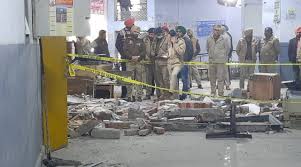The recent spate of the blasts reported at or near police posts in the border districts of Punjab, has raised serious concern for the ruling AAP government, because investigations so far suggest the involvement of Pakistan-backed Khalistani elements in these incidents. A report by Rajesh Moudgil

As many as eight incidents of bomb blasts, reported in the past about a month’s time in Punjab, has shaken the ruling Aam Aadmi Party (AAP) government, making it sit up and take a note; for, the common strand in most of the cases was alarming – hand of Khalistani ultras backed by Pakistani agencies. Also, according to media reports, the police investigation reveals the ultras got these acts executed through their modules by involving gullible youths by luring them with money, drugs and promise of a `safe haven’ abroad, through the gangsters and drug smugglers.
While the Punjab police have identified the suspects in all the eights cases, it has also nabbed the suspects of five cases while the investigation into the remaining cases is on. The police probe has learnt that the RDX and Austrian-made Arges grenades used in these blasts were supplied from Pakistan.
According to information, while the RDX was used in the Ajnala (district Amritsar) police station, Arges grenades were used in the remaining seven cases, which were supplied from Pakistan to the modules of Babbar Khalsa International (BKI) and the Khalistan Zindabad Force (KZF) via drones and other means.
The Police have nabbed two accused, including a minor, who worked for a terror module run by BKI terrorist Happy Pashia and absconding drug smuggler Happy Jat in connection with the November 23 Ajnala police station case where a suspected IED weighing about 1.5 kg was planted.
Police traced the BKI module of Jashandeep and his accomplices in the case of November 29 blast near an abandoned police post in Gurbakhsh Nagar in Amritsar.
In the case of December 2 grenade attack at Ansaro police post in Nawanshahr, which did not explode, the police have nabbed three accused who were associated with KZF.
In the case of December 4 grenade blast at Majitha police station, the police have traced the involvement of BKI module of Jashandeep.
Investigation into the December 13 case in which a grenade was thrown near Ghania Ke Bangar police station in Batala town in Gurdaspur – which did not explode – is still on.
Police investigation is also on in the December 17 case in which an explosion was reported near the Islamabad police station in Amritsar, though the police have found a handiwork of BKI module and gangster Jeevan Fauji.
The police probe is also on in the December 20 case in which a grenade attack was reported at the Wadala Bangar police post.
However, in a major action, the Punjab police in a joint operation with the Uttar Pradesh (UP) police shot dead three members of the Pakistan-ISI’s sponsored KZF terror module, involved in grenade attack at a police establishment in Punjab’s Gurdaspur district, in the Puranpur area of Pilibhit district of UP on December 23, last.
The accused operatives were identified as Varinder Singh alias Ravi, 23, Gurwinder Singh, 25, and Jashanpreet Singh alias Partap Singh, 18, residents of Kalanaur area of Gurdaspur.
The trio suspects hailed from poor families with their kin finding it hard to believe they could be involved in such anti-national activities.
The development came in less than week after some unknown persons hurled a hand grenade at Bakshiwala police post under the jurisdiction of Kalanaur police station in Gurdaspur on December 18, 2024. Pertinently, terrorist organisation KZF had used social media platforms to claim responsibility for this act of terror.
Director General of Police, Punjab, Gaurav Yadav said that preliminary investigation has revealed that this terror module is controlled by Pak-based Ranjeet Singh Nita, the chief of KZF, and operated by Greece-based Jaswinder Singh Mannu, a native of Agwan village in Kalanaur.












